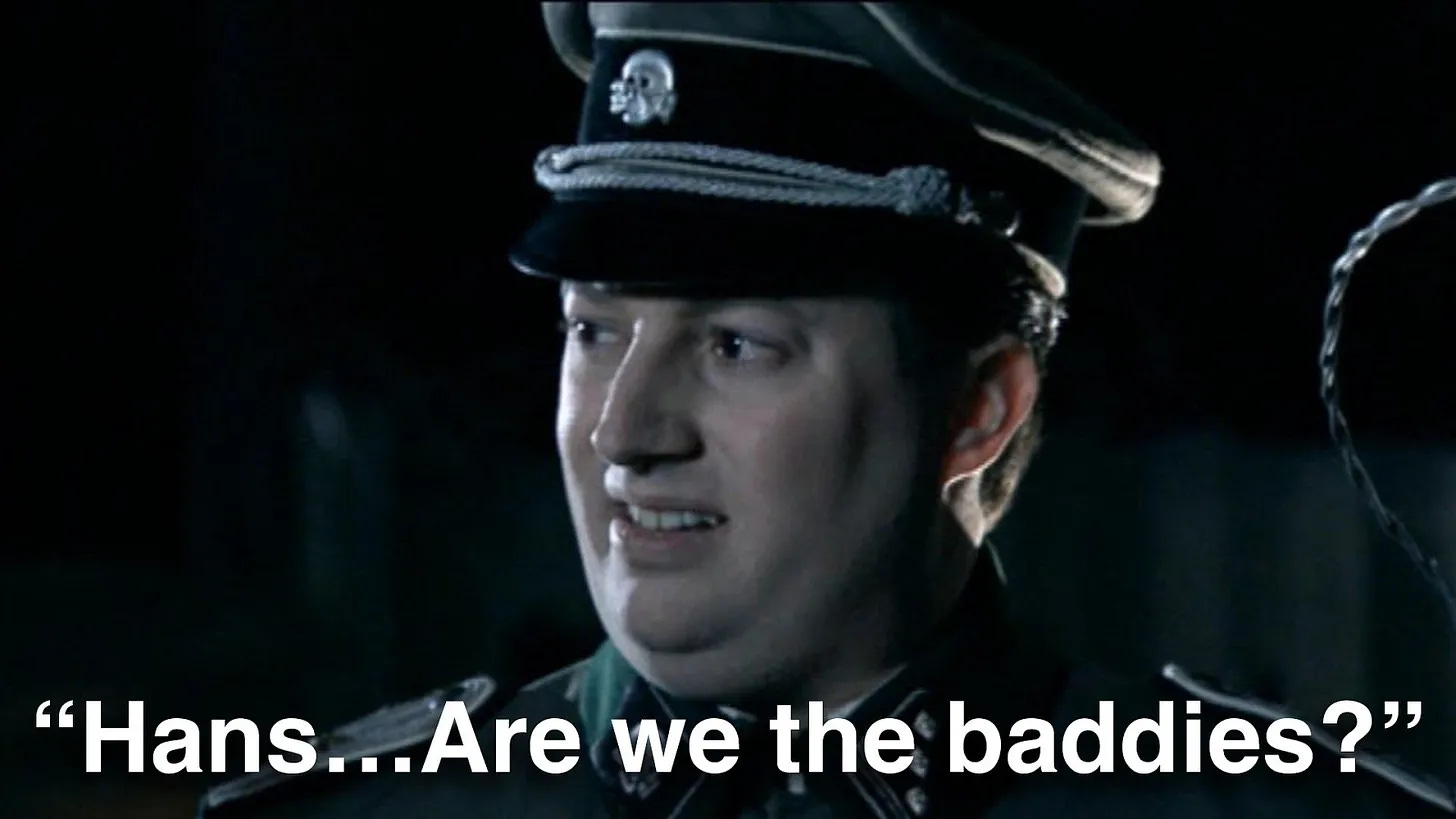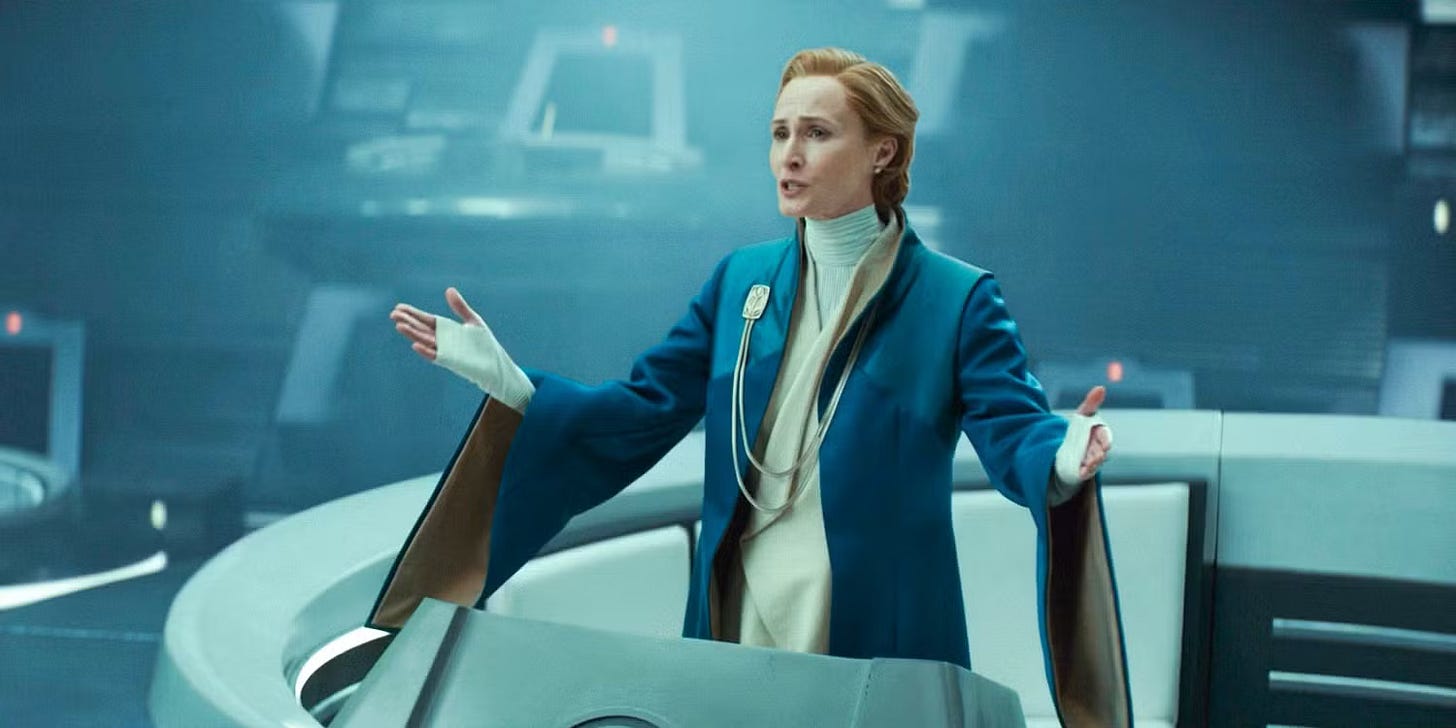No, Terrorists Are Not Heroes
Why “One Person’s Freedom Fighter Is Another’s Terrorist” Is a Dangerous Myth
“My rebel is your terrorist, is that it?” - Orson Krennic
Ben Mendelsohn’s character in Andor suggests that heroism and terrorism are just a matter of perspective. He’s not the first. Not the last. It was presented as a challenge to me in the first week of talking about heroism. It dropped into my LinkedIn comments this week.
But it’s wrong.
A hero acts to protect others and uphold values like justice and mercy. A terrorist uses fear and cruelty (and, you know, literal terror) as weapons. In other words, genuine freedom fighters or revolutionaries do not intentionally target innocent people – but terrorists do exactly that. This fundamental moral difference can’t be waved away as mere perspective. To call a terrorist a “hero” is yet another way to distort the very meaning of heroism, and it’s important to understand why.
At the heart of this issue is intent and action. Heroes may fight against great odds or unjust regimes, but crucially, they aim to protect life and minimise harm to the innocent. Terrorists, by definition, seek to terrorise – they intentionally inflict violence on civilians to instil fear and advance a cause. The ends do not justify the means. Even if a terrorist claims to fight for an objectively good cause, deliberately murdering innocents is never heroic. A political goal might appear legitimate, but how one pursues that goal matters immensely. A just cause cannot excuse atrocities. True heroes hold themselves to higher standards. They don’t achieve victory by abandoning morality.
There are also formal legal frameworks that distinguish legitimate resistance from terrorism. International humanitarian law (the “rules of war”) is very clear. Even wars have rules, and chief among them is “You do not attack civilians.” Combatants must limit the impact of violence on non-combatants – women, children, and ordinary people should never be deliberate targets. These rules come from treaties like the Geneva Convention, which almost every nation on Earth has agreed to. Under these laws, fighters who respect the distinction between soldiers and civilians can be considered lawful combatants or even freedom fighters in a struggle against oppression. But those who violate these rules by deliberately bombing marketplaces, buses, or schools are committing war crimes, not heroic deeds. Adhering to these principles of restraint is part of what can grant a struggle legitimacy. Terrorists, by breaking these universal rules, place themselves firmly on the wrong side of both law and morality.
And yes, I am aware that many nations (and individuals representing them) fail to follow these rules.
History and fiction provide plenty of examples to illustrate the difference. But first, it’s important in such examples to remember that painting an entire group with the same brush is rarely helpful. Just as not all firefighters or police officers are heroes, not every member of a freedom fighter group is heroic. When I talk about the French Resistance or The Rebellion, it’s as a group where there were some undoubtedly bad people. Very bad people. Terrorists.
Historically, many think of the French Resistance in World War II. They sabotaged Nazi rail lines and attacked occupation troops, but they did not plant bombs in cafés full of civilians. That’s why the world remembers them as heroes fighting tyranny. Similarly, during the struggle against apartheid in South Africa, Nelson Mandela initially advocated sabotage against infrastructure, explicitly to avoid killing innocent people. Though the apartheid regime labeled Mandela a “terrorist,” he became a hero to the world because his intent was to achieve freedom without senseless carnage.
By contrast, many other groups claimed to fight oppression but did so by choosing to massacre innocent people in repeated attacks. There is near-universal agreement that such acts are terrorism, not acts of heroism. No matter what cause they claim, terrorists betray the very concept of freedom by intentionally murdering the innocent. History shows that while oppressive governments may smear their opponents as “terrorists,” the real test is in the tactics. Those who deliberately shed innocent blood cannot be heroes. They are the baddies.
Fiction can shed light on these moral differences as well. I’ve just finished the Star Wars series Andor after resisting for years due to the terrible quality of every Star Wars product since 1984. In it, we meet a spectrum of characters fighting the evil Empire. The Rebel Alliance are the original story’s heroes – they fought to restore freedom. In Andor, among the emerging rebellion, there’s a character named Saw Gerrera who is portrayed as a cautionary tale. Saw is fiercely against the Empire, but he believes “I don’t have the luxury of principles” and resorts to brutal tactics that allow collateral damage to civilians. In the show, his extremism alienates other rebel leaders. The Alliance views Saw Gerrera as crossing the line; he and his group are even censured for their brutality. This fictional example makes a real point: even if the cause is just, the methods matter. Saw Gerrera is fighting oppression, but by behaving more like a terrorist, he loses moral credibility and ultimately the trust of his allies.
Meanwhile, the truly heroic figure in Andor is Mon Mothma. She’s a Senator who retains her conscience. She chooses to risk herself, not others. The show underlines that being a “freedom fighter” isn’t just about what you fight against, but how you fight. Heroes in fiction and reality alike refuse to adopt the enemy’s cruelty. They understand, as we should, that if you stoop to terrorising the innocent, you’ve abandoned the path of heroism.
It’s easy to throw up our hands and say “It’s all subjective – one side’s hero is another’s villain.” It’s easy and it makes people feel a “gotcha” moment. But when it comes to terrorism, we must be clear and we must be firm. Heroes do not intentionally prey on the innocent. Heroism is defined by courage and righteousness of action. A heroic resistance leader risks themselves to protect their people’s future; a terrorist chooses cowardly tactics that target the defenceless. No matter how noble someone’s stated cause, if they decide that slaughtering innocents is an acceptable strategy - a way to get attention - they have forsaken heroic values.
We should admire those who stand up to injustice without losing their humanity, and we should reject the false equivalence that tries to excuse terror as just “another point of view.” Terrorists are not heroes – because real heroes, in any galaxy or reality, don’t murder the innocent to achieve victory. They know that how we fight for what’s right is part of what makes us the “good guys” in the first place.
~ Matt





